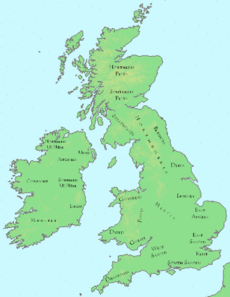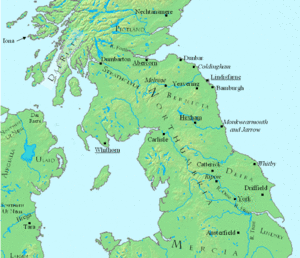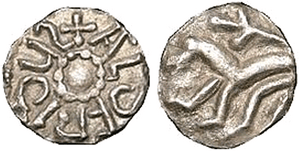Aldfrith of Northumbria facts for kids
Quick facts for kids Aldfrith |
|
|---|---|
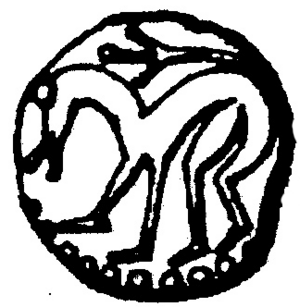
The lion symbol used on Aldfrith's coinage
|
|
| King of Northumbria | |
| Reign | 685–704/705 |
| Predecessor | Ecgfrith |
| Successor | Disputed between Osred and Eadwulf |
| Died | 14 December 704/705 Driffield, East Riding of Yorkshire |
| Consort | Cuthburh |
| Issue | Osred Osric? Offa Osana? |
| Father | Oswiu |
| Mother | Fín |
Aldfrith was a king of Northumbria, a powerful Anglo-Saxon kingdom in what is now northern England. He ruled from 685 until his death in 704 or 705. Unlike many warrior kings of his time, Aldfrith was known for his great learning and wisdom.
Writers from his era, like the famous monk Bede, described him as a very smart and educated man. His time as king was mostly peaceful, though he did have some disagreements with a powerful church leader named Bishop Wilfrid. Aldfrith's reign is often seen as the start of Northumbria's "Golden Age," a time when art and learning really flourished.
Contents
Aldfrith's Early Life and Becoming King
Aldfrith was born to Oswiu of Northumbria, who later became King of Northumbria, and an Irish princess named Fín. We don't know his exact birth date. His father, King Oswiu, died in 670, and Aldfrith's half-brother, Ecgfrith, became king.
Aldfrith was originally trained for a life in the church and became a scholar. He spent time studying in Ireland, which was a major center of learning at the time. This Irish education greatly influenced him.
In 685, a big change happened. King Ecgfrith was killed in a battle against the Picts (an ancient people in Scotland) at a place called Nechtansmere. With no clear heir, Aldfrith was called back to Northumbria, possibly from the island of Iona in Scotland, to become the new king.
Bede, a writer from that time, said that Aldfrith "ably restored the shattered fortunes of the kingdom." This means he did a great job of bringing stability back to Northumbria after the loss of its previous king.
Northumbria During Aldfrith's Rule
By the year 600, much of what is now England was settled by groups like the Angles and Saxons. Northumbria was formed by joining two smaller kingdoms, Bernicia and Deira. It stretched from the River Humber in the south to the River Forth in the north.
Aldfrith's father, Oswiu, had been a very powerful king, even ruling over other Anglo-Saxon kingdoms. But after Oswiu's death, Northumbria lost some of its power in the south. King Ecgfrith, Aldfrith's half-brother, also lost a battle against the Picts, which further reduced Northumbria's influence in the north.
Aldfrith decided to focus on making Northumbria strong from within, rather than trying to conquer new lands. He ruled both Bernicia and Deira, keeping the kingdom united. Even though Northumbria was smaller than before, it remained one of the most powerful states in Britain and Ireland.
The kingdom had important centers like Lindisfarne, Hexham, and Bamburgh in the north, and York, Ripon, and Whitby in the south. The borders of Northumbria were sometimes defended with large earthworks, showing they were important boundaries.
Aldfrith and the Church
The Church was very important in Northumbria during Aldfrith's time. Church leaders were not just spiritual guides; they also owned a lot of land and controlled trade. Important monasteries were like towns, as there weren't many cities back then.
Aldfrith had strong support from many church leaders, including his half-sister Ælfflæd and the respected Bishop Cuthbert. Aldfrith was also good friends with Adomnán, the head of the famous monastery on Iona. Adomnán even gave Aldfrith a book he wrote about holy places.
Bede called Aldfrith a "scholar king." His love for learning set him apart from many other kings who were mostly focused on warfare. Irish writers called him a sapiens, meaning a wise scholar.
However, Aldfrith's relationship with the Church wasn't always easy, especially with Bishop Wilfrid. Wilfrid had been exiled by the previous king, Ecgfrith. Aldfrith allowed Wilfrid to return, but they often disagreed. One main reason was that Aldfrith had been educated in the Celtic Church tradition, which was different from Wilfrid's Roman Church views. Also, Wilfrid wanted to control a very large church area, but Aldfrith and others thought it should be divided.
Their disagreements grew, and Aldfrith eventually sent Wilfrid away from Northumbria again. Wilfrid went to Rome to complain to the Pope, who supported Wilfrid. But Aldfrith refused to accept the Pope's orders to let Wilfrid return to his old position.
Northumbria's Golden Age
Aldfrith's reign is often seen as the start of Northumbria's "Golden Age." This was a time when amazing art, books, and learning flourished in the kingdom. This period lasted until the end of the 700s.
One of the most famous creations from this time is the Lindisfarne Gospels. This beautiful illuminated manuscript (a handwritten book with colorful pictures) was likely started during Aldfrith's reign. It was made by Eadfrith of Lindisfarne, who became Bishop of Lindisfarne in 698.
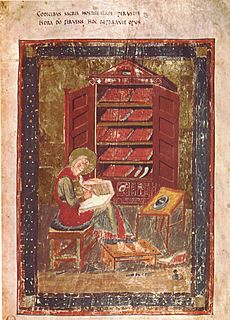
Another important book from this era is the Codex Amiatinus. This huge Bible was made at the monasteries of Monkwearmouth-Jarrow, where Bede lived. It shows how skilled Northumbrian artists and scribes were.
During this time, Northumbria also started making its own silver coins called sceattas. These coins were more practical than the older gold ones. Aldfrith's coins are special because they have his name on them, which was unusual for the time. Many of them show a lion.
Aldfrith's Family and Death
Aldfrith married Cuthburh, who was the sister of King Ine of Wessex, a powerful king in southern England. This marriage helped create an alliance between their kingdoms. However, the old records say that Aldfrith and Cuthburh later separated. Cuthburh then became the head of a monastery.
Aldfrith had at least two sons: Osred and Offa. It's not clear if Cuthburh was their mother. Osred became king after Aldfrith, but only after a short conflict. Another son, Osric, also became king later.
Aldfrith was sick for some time before he died on December 14, 704 or 705. He died in a place called Driffield. After his death, there was a disagreement over who should be the next king. Some supported Aldfrith's young son Osred, while others supported a different person named Eadwulf.
Aldfrith was remembered as a wise and learned king. Some old Irish writings, called the Briathra Flainn Fhina Maic Ossu, are believed to contain his wisdom. They include sayings like:
- Learning merits respect.
- Intelligence overcomes fury.
- Truth should be supported.
- Falsehood should be rebuked.
- Good should be exalted.
Images for kids
See Also


